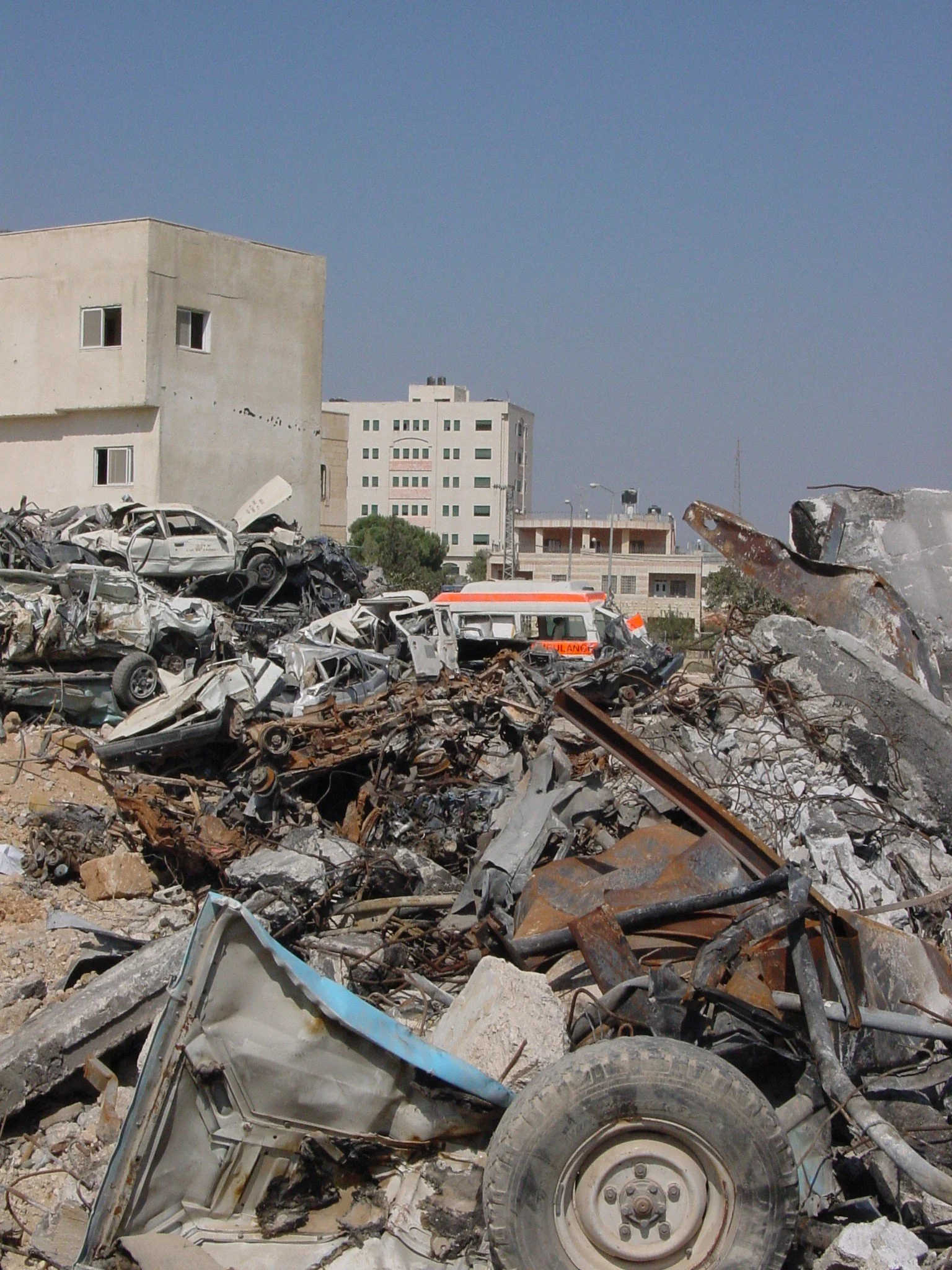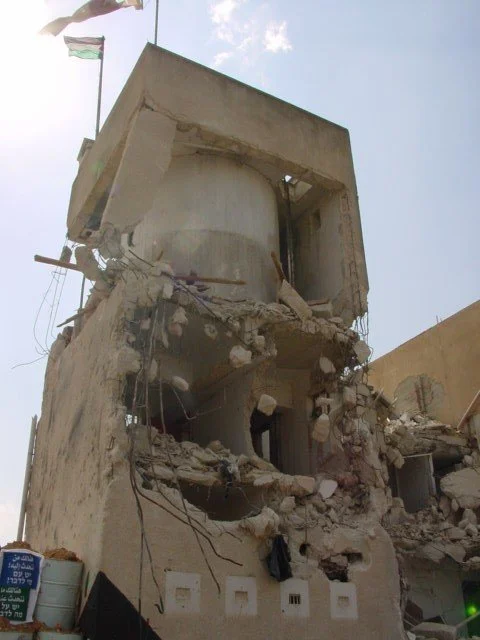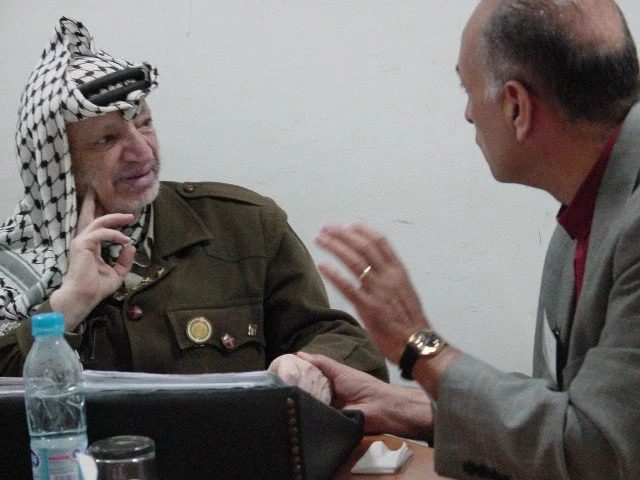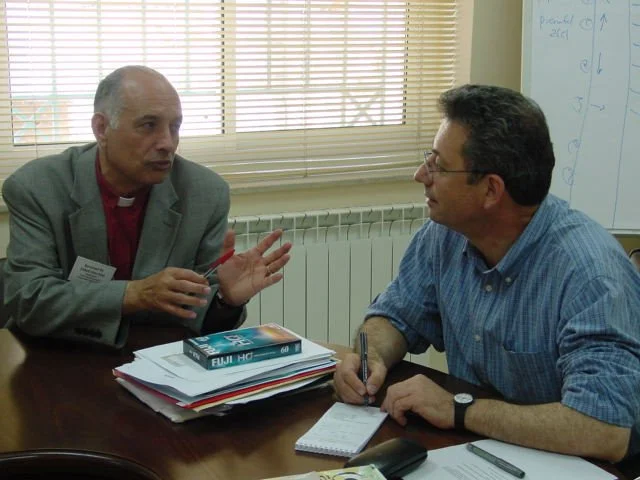October 15, 2002
Detritus surrounds the Palestinian Authority presidential compound in Ramallah.
Long before the group arrived at Tel Aviv, the organizers of the tour and visit had contacted both the Israeli government and the Palestinian Authority to set up meetings. Despite repeated requests, the Israeli government never responded (despite the fact that Rev. Dr. Canon Fahed Abu-Akel is an Israeli citizen). The Authority, on the other hand, set up a meeting with Yasser Arafat. And so off we went to the muqat'a, the presidential compound.
The Israeli troops had recently pulled back, but their mark had been left. The place is a moonscape, bordered by barbed wire. Hundreds of employee and security vehicles are piled up into what looks like a junkyard. The building where Arafat is spending all of his time now is piled high with sandbags, a narrow slit ready to welcome visitors. We were welcomed to bring our cameras in, but cellphones had to be turned off - possibly related to last night's events.
Part of the presidential compound’s destruction.
For forty-five minutes, we met with a man who over many decades has become a legend - both despised and beloved. Most of the time was dedicated to his reciting of Israeli affronts to Christian institutions and property in the last two years: the siege at the Church of the Nativity, the pockmarking of the Virgin Mary statue, the dynamiting of St. Barbara's Church in Aboud...Sometimes we need to be reminded of these things. The windowless conference room where he received us is also now his bedroom and dining room. He looks old, sick, and tired. And it was clear from our conversation that he has no vision of a future for his people. No matter one's opinion of the man, such a lifestyle can't be positive - psychologically, spiritually, physically, mentally.
Meeting with Palestinian President Yasser Arafat.
As we met with him, one of his advisors came in: a car bomb in Northern Israel. He was clearly exasperated, directing his anger at Hamas in particular. "I will pay the price for this. You will see." We left just as another group was coming to be received - it seems to be what he spends most of his time doing these days - and, realistically, there's very little else he can do.
Dr. Mustafa Barghouti, Union of Palestinian Medical Relief Committees.
We had planned to leave from there, but called on Dr. Mustafa Barghouti at the Union of Palestinian Medical Relief Committees. In contrast to almost everyone else we met, he had a clear understanding, explanation, and hope for a way out of the situation. With the mind of a doctor looking at the symptoms, he could advise a cure. And, in something that is so refreshing here, he isn't afraid to tell the truth. He spoke about the frustrations they face (for example, two clinics, in neighboring villages across a settler by-pass road, are now five hours apart) as well as his energy's focus now, the growing non-violent resistance movement to protest the Occupation and show solidarity with besieged Palestinian civilians. Barghouti described how Israeli and Palestinian activists have been joined by several groups of internationals in non-violent protests. And when he noted that these non-violent actions often prompt a violent response from the military or police, he spoke as more than an eye-witness, having taken a beating, too.
Marthame left the group and went to Qalandia to find a taxi bound toward Jenin, first waiting in line for the slow process of clearing Israeli security person by person. Withouth proper permissions, Palestinians are turned back, even though Qalandia is now the main travel center for the West Bank. If you want to travel to Jenin from Ramallah, you have to pass through Qalandia. But if you don't have Jerusalem permission papers, you cannot get out of Ramallah. Fortunately, the American passport still carries weight.
The taxi filled quickly and the journey began. Bypassing the bypass roads, the taxi was stopped by an Israeli jeep. We waited in the sun for half an hour while some IDs were randomly checked and the bags in the trunk were glanced at. While waiting, someone in the back seat told a joke. Marthame smiled at the wrong moment, when the Russian policeman was looking at him. He came over and asked in Hebrew, "What are you laughing at?" Then in Arabic, "Are you a Muslim?" A cursory passport look and a few more failed attempts at communicting in Hebrew were all that was required.
Two checkpoints later, Marthame arrived home - word had already gotten around the village about the meeting this morning. Word travels very fast here.




